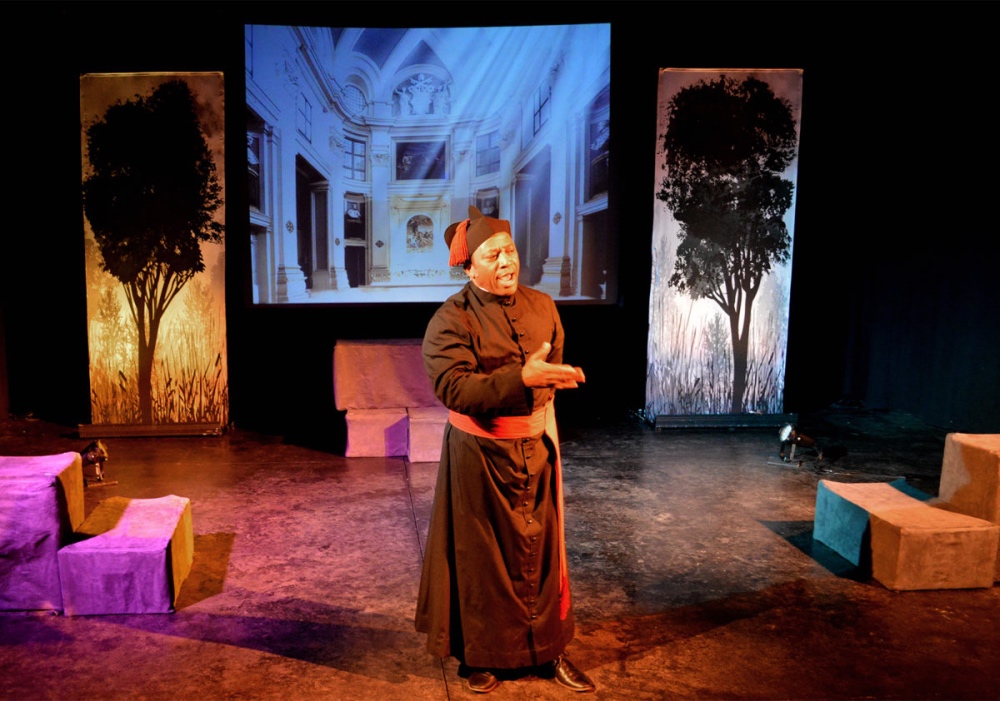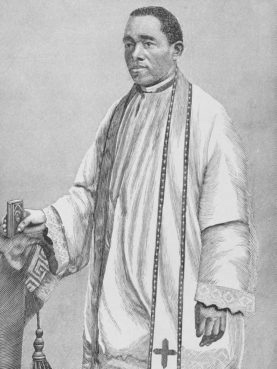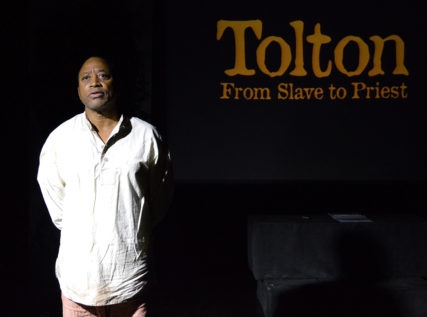Pasadena, California, US
RNS
Actor Jim Coleman stood at the front of a dimly lit stage and recounted the joys and hardships of being a black man of Catholic faith.
As the star of the play Tolton: From Slave to Priest, Coleman was portraying the life of Rev Augustus Tolton, the first known African American to serve as a Catholic priest in the United States.

Jim Coleman portrays Father Augustus Tolton in “Tolton: From Slave to Priest.” Photo courtesy of Saint Luke Productions
The one-man multimedia performance, presented by Saint Luke Productions, toured several parishes in the Archdiocese of Los Angeles this month (from 10th to 15th February), with a private showing on 18th February at St John’s Seminary in Camarillo.
Tolton, born into a family of slaves in Missouri, escaped during the Civil War with his mother and siblings and settled in Illinois. His father had already escaped to join the Union army and his family later learned of his death.

Father Augustus Tolton in 1887. PICTURE: Courtesy of Creative Commons
In Illinois, Tolton, who had been baptised in his former owners’ Catholic faith, faced pushback from peers and parents while attending all-white Catholic parish schools, according to Tolton’s biography provided by the Archdiocese of Chicago.
Undeterred, Tolton pursued the priesthood, studying in Italy after US seminaries refused to admit a black man. He was ordained at the age of 31 in 1886.
In the play, Tolton refers to the US, as “foreign land” where, after “living in freedom for six years,” he returned on finishing seminary.
Tolton was sent to Chicago, where he helped oversee the construction of St Monica’s Catholic Church, a black parish. Known as “Father Gus,” Tolton spent much of his career seeking help for the the poor in his black community.
In June, 2019, Pope Francis officially declared that Tolton “lived a life of heroic virtue,” and the priest is now on the path for sainthood. His cause for canonisation was opened by the Archdiocese of Chicago in 2010.
In Pasadena, the seats were filled for a showing of Tolton at St Andrew Catholic School on 12th February. Some cheered and others cried as the play demonstrated how Tolton’s faith helped him cope with the racism he encountered before he went to seminary.
“People need to see that their spiritual life can help give them the strength to persevere in troubling times,” said Edwina Clay, president of the Altadena/Pasadena Black Catholic Association, who said the play was still relevant.
The Archdiocese of Los Angeles, which hosts Masses in about 40 languages, has been lauded for its diversity, but in its more than 80-year history, only one US-born black pastor has served in its parishes.
It’s a problem that spills down to the pews, Clay said.
“If young people don’t see folks who look like them, they don’t have any aspiration to be like them,” she said.
Black Catholics have made up a stable three per cent of US Catholic membership for decades, with significant numbers of African Americans in dioceses in Brooklyn, Los Angeles, San Bernardino and Baltimore, according to the United States Conference of Catholic Bishops.
To Anderson Shaw, director of the African American Catholic Center for Evangelization, the play helps bring visibility to the black Catholic community in the US. “By having visibility, it allows us to have a voice,” Shaw said.
The play, Shaw said, is not simply a reaction to past injustices.
“One can get encouragement and inspiration from stories,” Shaw said. “Our intent is to inspire people to encourage them to lift themselves up when things get a little tough.”

Actor Jim Coleman. PICTURE: Courtesy of Saint Luke Productions
Shaw said the play was included in a pastoral plan that came out of a 2017 meeting of the National Black Catholic Congress that addressed the lack of African American priests.
In the pastoral plan the group pledged to stand against racism and to work on issues such as mass incarceration and domestic violence, Shaw said.
“You have people saying the church is not racist,” but, he said, if you ask parishioners if they have experienced racism in the church, “the answer is going to be yes.”
Local parish leaders and congregants need to do more to draw African Americans into the priesthood, Shaw said. There can be pastoral plans, Shaw said, but “the people in the pews don’t relate to that.”
As a sign of progress, Shaw pointed to the Rev. Jeffrey Harvey, an African American Vincentian priest, who is teaching homiletics – the art of preaching and delivering sermons – at St John’s Seminary, where men are prepared for the priesthood in the Los Angeles archdiocese.
African Americans are big on preachers, Shaw said. “If you ask them what was the most important part of the Mass, it’s the singing and preaching,” he said.
To have Harvey teaching L.A.’s next generation of priests how to preach is significant, he said.





